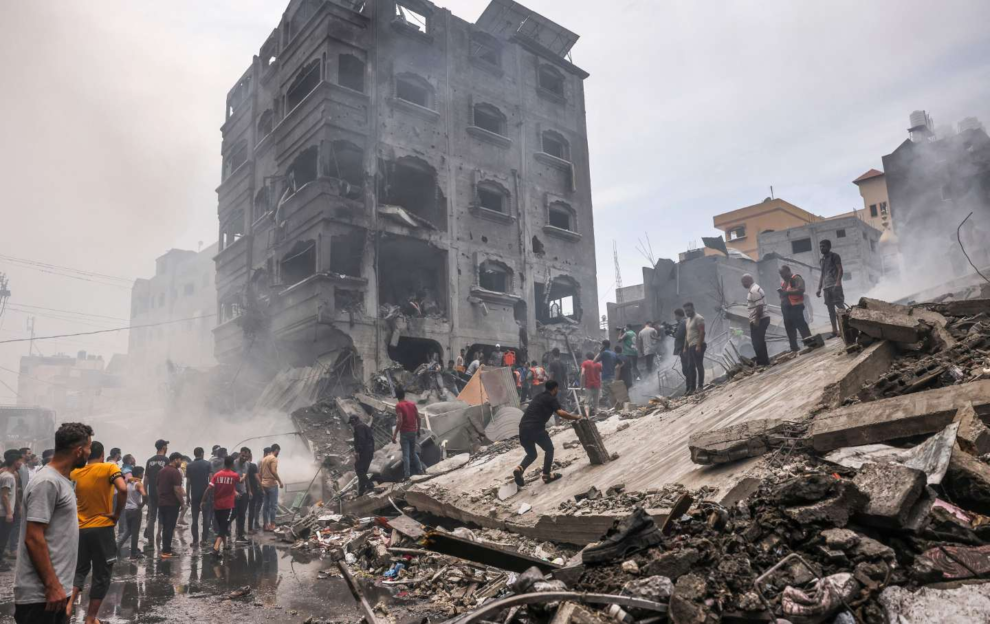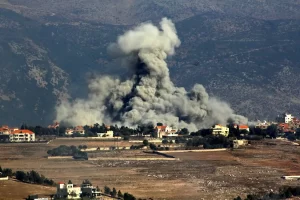When the Israeli defence minister declared on 9 October a “complete siege” in which “no electricity, no food, no water, no fuel” would be allowed into blockaded Gaza, and called its 2.3 million inhabitants “human animals”, there was not a single protest from an official in a western capital. It is easy to see Palestinians as standing alone against Israel’s military onslaught. Egypt and Israel, at peace since 1980, jointly blockade Gaza. In recent years, the region’s US-backed authoritarian governments such as the United Arab Emirates have been signing a series of accords to normalise relations with Israel without any gains for the Palestinians. The widespread support that Palestinians received from Arab governments five decades ago has virtually evaporated.
Yet looked at on a global scale, there is overwhelming support for Palestinian self-determination, and condemnation of Israel’s latest attack on Palestinians in Gaza. Currently, 139 out of 192, or 72%, of UN member states recognise Palestine, against the express wishes of the US and Israel. This constitutes almost the entirety of Asia, Latin America and Africa, along with several European countries such as Sweden. Recent additions include Mexico, which broke with decades of fealty to the US by recognising Palestine in June.
This recognition has limited material effects for Palestinians, whether living in historic Palestine or in exile. But it points to a broader split in world opinion. On key issues of international politics and economics, a chasm exists between a small group of former colonial powers and the rest of the world. The global divide on the Palestinian question maps almost exactly on to a longstanding G77 v G7 split.
The G77 was founded in 1964 to represent the economic and political interests of developing countries in Africa, Asia and Latin America, and has since expanded to 135 countries. A decade later, the G7 was created as a forum to advance the interests of seven of the richest states in the world. It is composed of four western European countries, the US, Canada and Japan (the EU has also since been given an honorary eighth seat).
While the G77 states overwhelmingly support the Palestinian right to self-determination, not a single G7 member does. Six out of nine of Israel’s top trading partners are in the G7. Israel’s top three sources of weapons imports are G7 states. The G7 has also consistently opposed calls for a ceasefire in Gaza. On 27 October, when a UN general assembly resolution calling for an urgent ceasefire in Gaza passed overwhelmingly with 121 votes, France was the only G7 state that voted in favour.
For many in the global south, the existence of the G7 represents a long history of racial and imperial arrogance. “Such a small section of the human population should not be allowed to speak for all of us,” argued the Tricontinental Institute for Social Research earlier this year. Oxfam International’s interim executive director, Amitabh Behar, noted that “wealthy G7 countries like to cast themselves as saviours” but that “they play by one set of rules while their former colonies are forced to play by another”. Israel’s close association with the G7 fuels the idea that it is tied to western neocolonialism in the Arab world.
Across the global south, opposition to Israel is also tied to its history of collaboration with repressive states in Latin America, Asia and Africa. In Latin America, Israel supplied arms to Guatemala’s government during its genocide of the Mayans in the late 1970s, was a major arms supplier to Pinochet’s dictatorship in Chile, armed the Somoza dictatorship in Nicaragua, supported military repression in El Salvador and Argentina, and armed the Mexican state in its war against the Indigenous Zapatista rebellion.
In Africa, Israel backed white-minority regimes as they faced growing international isolation. During the 1970s, Israel developed close relations with apartheid South Africa and remained one of the country’s strongest supporters throughout the 1980s. Israel also continued to trade with the racist regime in Rhodesia after the UN imposed sanctions on the country in 1967 and sold arms to the Mobutu dictatorship in Zaire.
Alongside other activities in Asia – trading with Indonesia’s Suharto dictatorship and the Marcos dictatorship in the Philippines, expanding its military cooperation with Modi’s Hindu nationalist government in India (which has become the world’s largest purchaser of Israeli arms) and selling arms to Myanmar’s junta – Israel has developed a reputation across much of the global south as a staunch ally of repressive governments seeking to destroy popular struggles and movements. A history of racist statements by Israeli officials has been viewed in this context. In 2006, for example, the Israeli ambassador said that “Israel and Australia are like sisters in Asia” because “Asia is basically the yellow race” while “Australia and Israel are … basically the white race”.
Israel’s current war on Gaza has become another example of the stark gap that has emerged between the G7 and the rest of the world. Israel is unlikely to benefit from its longstanding association with former imperial powers. If the current crisis has driven Israel and the G7 even closer together, it has also increased the sense of alienation that the vast majority of the world’s population feels towards the small elite that claims for itself the power to rule the world. The untrammelled support of powerful states for Israel as it commits what a former UN official called “a textbook case of genocide” in Gaza has contributed to a growing sense that the current international order lacks legitimacy. At the UN last Tuesday, the Indonesian representative said that the world was heading towards an “international law abyss”.
In the history of the past century, the opinion of the majority of people has typically found a way of shaping policy through public pressure and activism – in Vietnam, South Africa, Algeria and Rhodesia (now Zambia and Zimbabwe) – despite the opposition of western states. We may be witnessing such a moment now. As Ahmad Ibsais, a Palestinian-American who attended a demonstration in Washington DC, wrote last week: “A tide is turning. People are no longer confused about who the oppressor is.”
Source : TheGuardian






































